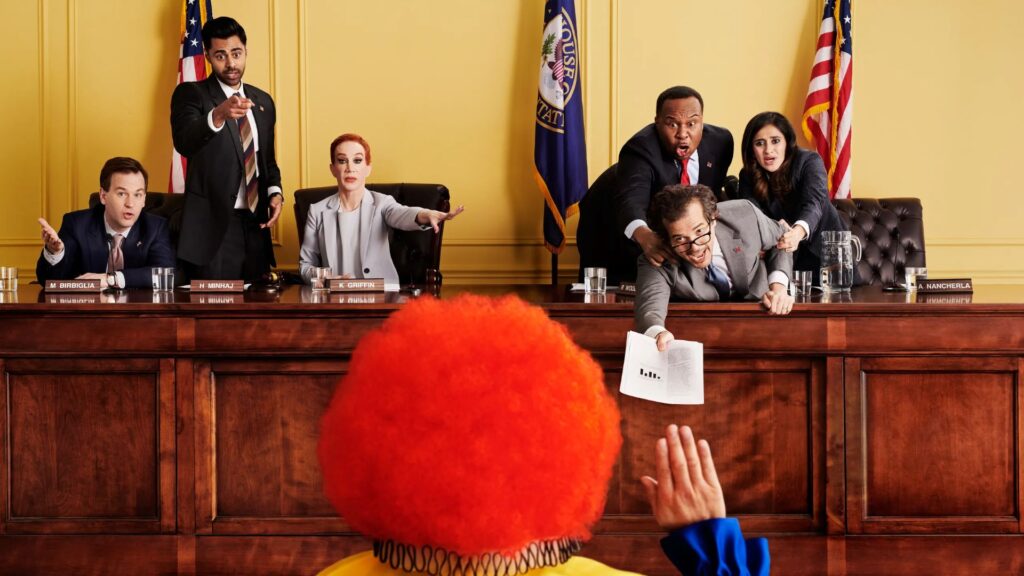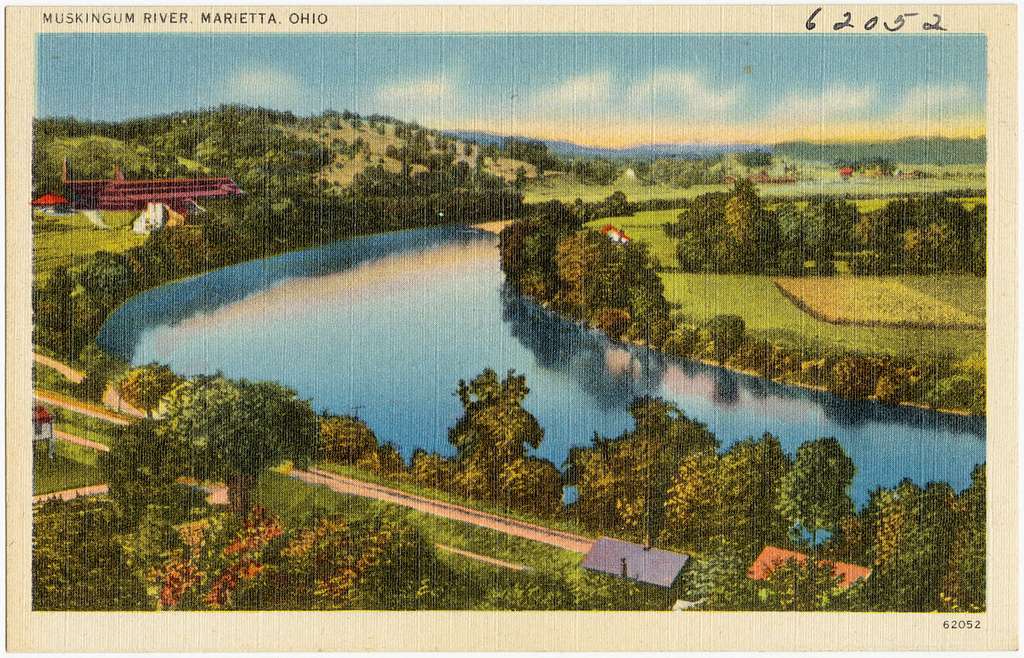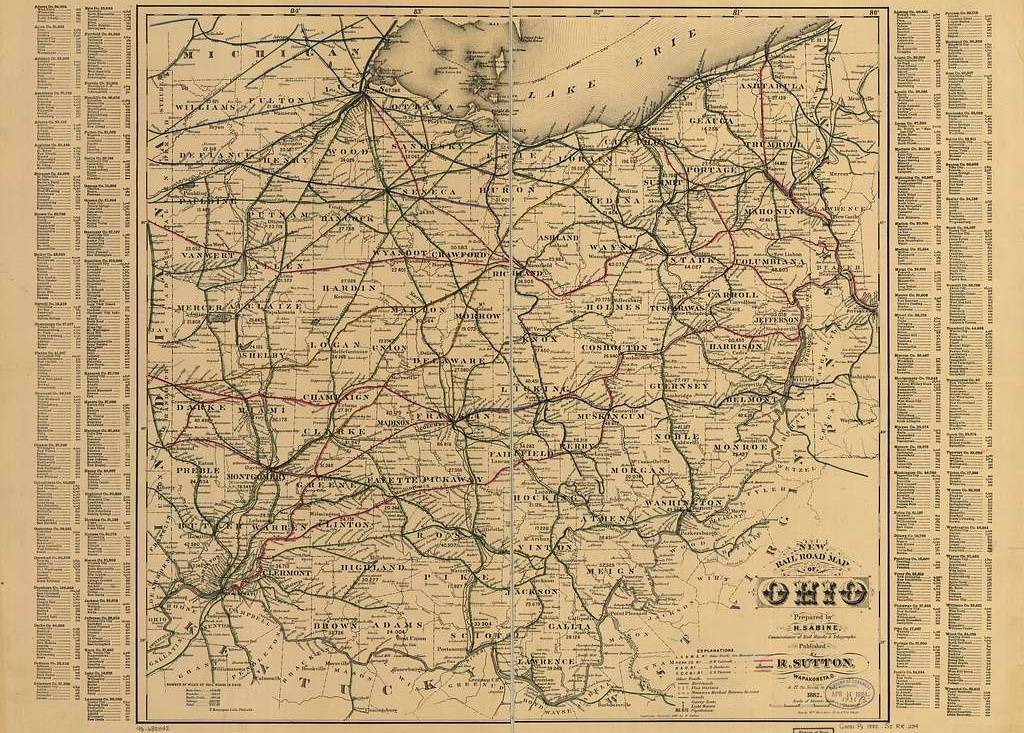While doing research for this site, I have run into countless articles, web pages, or online forum discussions pertaining to “Weird Ohio Laws”. (This is, of course, not a phenomenon exclusive to Ohio.) They’ve proven to be quite interesting to read, and they’re pretty funny, too. However, when I started looking a little deeper into these laws, I came to the realization that they’re not exactly true. While some seem to be based on a misunderstanding or weird interpretation of current or former laws, others … I have no idea where they came from.
So, it got me thinking … where is the boundary between truth and fiction when it comes to these “Weird Ohio Laws”?
Please note. I am not a lawyer, nor have I ever played one on TV. This post will contain no legal advice. I have attempted to research each topic I discuss in great detail, but there may be errors. So, before you act, do your own research and if you get arrested, especially for something totally stupid, that’s your fault – not mine.
In Cleveland, It’s Illegal To Catch A Mouse Without A Hunting License
First off, I wasn’t aware that they gave hunting licenses to mice, but … what do I know.
There are many websites that list strange and unusual laws in Cleveland, Ohio and this appears on just about all of them. The problem is that when I search through both the state and municipal codes, this law does not seem to be anywhere on them.
The closest thing I found was Rule 1501:31-15-03 | Nuisance wild animal control. Ohio Administrative Code/1501:31/Chapter 1501:31-15 | Hunting and Trapping however there is nothing particular to the Cleveland area, and no part of this says you need a hunting license to catch or trap a mouse. What this law does do is lay a framework for nuisance pest control solutions.
So, then, why do so many people want to claim that one needs a hunting license to trap a mouse?
A clue to this was provided by Lake County Chief Deputy Frank Leonbruno, in a 2017 facebook post to the Sheriff’s Office Facebook page. There, he does claim that at one time, it had been illegal to catch mice without a hunting license, saying it was one of the county’s “Blue Laws”. These are laws that date back to the extreme early days of the county (so, the early 1800s) but, for the most part, haven’t carried over to the modern legal codes. As an example, the most common “blue laws” involve restricting the sale of alcohol on Sundays, and can vary from place to place.
Sadly, Leonbruno doesn’t give much more information than that. Yet, doing further research does give a few more clues.
At various points in early Cleveland history, they did have a bit of a rodent (ok, mice) problem. They had dirt or dirt and gravel streets, which quickly turned to mud when wet. Indoor plumbing didn’t start becoming a thing until the 1940s, and at first it was a luxury that not everyone could afford. Instead, people just flung their dung into the road and called it a day. After all, horses could poo all they wanted in the streets, so, why not throw the people poo there, too? And, dare I mention trash? What wasn’t burned or hauled off to the city dump … where, exactly, do you think that went?
Ok, so maybe I took an ever so slight liberty there, but you get the general idea. It’s not hard to see how cities back then became a breeding ground for all sorts of rodents.
Being that rodent infestations presented a new problem in the new world, different places were able to come up with different ways of handling the problem … and, sadly, it usually backfired.
There is one rather famous example, I won’t name the place because it’s actually a kind of cool place now … but, when the rat problem started to get out of control, the city leaders essentially put out a bounty on any dead rat that a resident could catch and kill. The intention was to give people an incentive to catch and kill these rodents, as if the wife screaming at her husband “A mouse. Kill It? Kill It A Lot!!!” wasn’t incentive enough. But, sadly, this backfired big time … and it kind of greatly increased the rat population, rather than shrink it. See, people started breeding mice, rather than catching them, and then taking these into the authorities for their payment. And, when the town coffers started to dry up temporarily, these rats were just let loose on the city to fend for themselves.
In a similar example, a different city seemed to have too many rat catchers. These guys would then fight over territory, kind of like gangs, but with containers full of rat poison as opposed to guns. The city attempted to rectify this problem by requiring rat catchers to register (and pay a “small fee” to the city, of course) which caused most of the men in the critter control business to find a new career. Without anybody working on making the rat population any smaller, it quickly began to grow at an astounding rate.
Quite frankly, I have no clue if either of these things happened in Cleveland, or if the “you need a hunting permit to catch mice” has anything to do with this period in time. But, in a way, it does sound like a viable option.
In Oxford, It’s Illegal To Spit On A Sidewalk
This does appear to be another blue law, although like the one before, I have so far been unable to pin down where, exactly, it came from.
That being said, for a short period of American history, passing “sidewalk” laws did seem to be the hip thing to do.
Before this period (which I want to put mainly between the 1880s and the 1930s) American Streets were, for the most part, free-for-all zones where common decency ruled the day.
And then, things changed. Suddenly, the streets were being shared with not just pedestrians and the occasional horse, but automobiles and electric and utility poles, modern sewage systems, just to name a few. Let’s just say that with all this new stuff going on, screaming, “Goodness, how rude!” wasn’t enough anymore. So, we started passing a lot of laws…
One of the most common blue laws from this period actually involves sneezing. Yes, it was illegal to sneeze on the sidewalks in many towns and cities across the nation. Today, this might seem kind of weird (ok, not “kind of”) but at the time … it actually served a function.
As cities began to grow, horses … well, they got kind of nervous. With just a few people on the streets, they were just fine standing there doing their thing. But, one hundred people? They could scare easily. You never knew if that drunken bum was gonna start a fight with a horse … you didn’t know if that car was going to plow right into them … so, yeah, they had a right to be somewhat scared.
Nothing scares a horse more than a sudden, loud noise … and being that sneezes were sudden, loud noises … sneezing on the sidewalks or in the streets became a taboo thing, and some places made it illegal. All it took was a horse to panic after someone sneezed, trampling poor Aunt Irma to death for some lawmaker to think “that should be illegal”.
Modern medicine (or, at least what was modern at that time) was starting to advance to the place where we started to realize that diseases were sometimes spread on the streets through what we would think of as unsanitary practices today, including things like peeing and pooping on the side of a building, spitting, and of course farting in front of the butcher after he charged your wife too much on her last order. (What can I say, we weren’t always correct with our new information.)
Combine this with the fact that streets were becoming a new form of social zone, where Aunt Irma would take a leisurely stroll down the street, getting the latest gossip from the florist before picking up the latest fad food from the market. A lot of people were trying to make cities more civilized, places where the “common folk” could spend their time without worrying about standing downwind from that overcharging butcher.
People wanted everyone to be on their best behavior on the streets, or at least the ones where they lived and shopped (and frequently traveled). So, a lot of placed adopted laws like “no spitting on the sidewalks” to not just make the streets a little less disease ridden, but also to make them a bit more civilized.
In The State of Ohio, It’s Illegal To Not Honk Your Horn When Passing Another Vehicle
Once again, we are going back to the time when American streets were shared between pedestrians, horses, and those newfangled automobiles. Since most cities and towns had (overall) a lot less population than they do today … and since not everyone could afford a car … there weren’t nearly as many cars on the road as one would expect. One the way from home to Church, Aunt Irma might pass one or two cars … and that just might be it.
In the early days of automobiles, there also weren’t that many traffic laws (maybe because there wasn’t that much traffic?). Streets, even if they were paved, didn’t have white lines on the edges, or double yellow lines in the middle forcing traffic to travel in a specific direction. It’s also important to remember that even though a fifteen mile-per-hour car might be considered slow by today’s standards, back then that was kind of fast. With the roads a chaotic mess, honking the horn to alert nearby motorists (and pedestrians) seemed like a good idea at the time.
Yet, this “law” remained on the books well into more modern days, even appearing in the state’s Driver’s Manual until a few years ago. At that point, the wording may have changed a bit, perhaps to clear up some modern confusion.
For the record, today (2023) the Ohio Driver’s Manual lists several times when it is appropriate to use your horn:
- When pedestrians or bicyclists are preparing to move into your lane of travel
- When passing a driver (who is in the process of veering into your lane)
- A driver is not paying attention or may have trouble seeing you.
So, today it is appropriate to honk while passing a driver, but only when the person is veering into your lane. Which, frankly, to me seems like a better clarification. But, some can argue that honking is encouraged when passing another driver if you have reason to feel they are not paying attention or might have trouble seeing you. Considering practically every type of auto has blind spots that any passing driver is going to drive through, this argument can stand.
However, I still wouldn’t advise honking every time you pass someone. I am sure Miss Manners would say doing that would be rude. Then again, I think she’d say the same thing to those knobheads to honk their horns to let other drivers know that the person honking is a much better driver than everyone else and they happen to think the person they’re honking at is an idiot. As this seems to be the case with most times I’ve heard a car horn, it really makes me want to move onto the next weird law.
Speaking of car hornes…
In Fairview Park, Ohio, It’s Illegal To Excessively Honk Your Car’s Horn
If there are any of these laws that I really want to be true … it’s this one. A quick scan of the Fairview Park legal codes doesn’t say anything about “excessive honking one’s car horn” … it actually does come kind of close.
Municipal Code 337.19 (c) states “No person shall use the horn of a motor vehicle except to give warning to other drivers or pedestrians.” And code 509.14 (c) states that “No person shall, after a request to desist, make, continue or cause to be made by the use of any horn, bell, radio, loud speaker or by the operation of any instrument or devise [sic], any unreasonably loud, disturbing and unnecessary noise or noises of such a character, intensity and duration as to disturb the peace and quiet of the community or to be detrimental to the life and health of any individual, and no person shall willfully conduct himself in a noisy, boisterous or other disorderly manner by either words or acts which disturb the good order and quiet of the community.”
So, while the law does not say anything about “excessive” use of one’s car horn, it does state that your car’s norn should only be used to alert other drivers or pedestrians … and any unnecessary, unusually long or loud use of any horn (not just a car horn) could be considered a disturbance of the peace.
So, maybe don’t honk your car horn in Fairview Park at all … or, unless it’s absolutely necessary.
In Columbus, It Is Illegal To Sell Corn Flakes On Sunday
Once again, I have combed through city and state codes and have found not a single reference to Corn Flakes, or why anybody would want to claim it was illegal to sell them on Sundays in Columbus.
That being said, there is an urban legends about Corn Flakes that may (or may not) come into play here.
The Urban Legend is that Corn Flakes were invented by John Harvey Kellogg as either a cure for (or an aversion to) male masturbation. This idea is not true, however if you twist logic just enough, I can see why people might claim that it is. J.H. Kellogg did have some rather eccentric views on a number of subjects, including the benefits of a “bland diet” as well as the evils or perils of male masturbation. However, there is evidence that Kellogg ever equated the two. No papers tied directly to him ever mention his thoughts on both subjects.
In other words, Mr. Kellogg did talk about his belief that eating a bland diet would make men healthier. Other times, he was known to talk about his belief that masturbating was unhealthy. However, he never said that eating a bland diet would cause people to masturbate less.
If there is something that we can (a bit more truthfully) blame for the creation of Corn Flakes, it’s going to be the sanitarium the Kelloggs brothers ran in Battle Creek, Michigan. They had been looking for a low-cost, easy to prepare breakfast meal for the inmates (patients) and Corn Flakes did provide a solution there. However, the brothers also disagreed over how the Corn Flakes should have been made in the first place. While John Henry Kellogg wanted them pretty much the way they are now, his brother Will thought they were too bland and tried to advocate that adding some level of sugar to the flakes would make them more palatable. (Today, Frosted Flakes sell much better than Corn Flakes, so I want to think that maybe he was right.)
Those who talk about this theory tend to pull up a quote, supposedly from J.H. Kellogg, calling Corn Flakes a”healthy, ready-to-eat anti-masturbatory morning meal” but there is no evidence that Kellogg ever spoke those words. The earliest use of that phrase comes from a 2012 Mental Floss article which offered no sources or corroborating evidence at all.
Another source of possible confusion revolves around what we call “Blue Laws” today, most of which prohibited the sale of alcohol on Sundays. There are a number of examples of places that brought these laws into the current codes (probably any place that still outlaws the sale of alcohol to some effect on Sundays) at least to some degree, many places did not. Because the modern criminal and legal codes replaced the basis for these blue laws, they were never repealed in a legal sense, and therefore some argue how because of that, they are still, technically, laws. (That is usually not the case, either.)
While various forms of alcohol were the main subject of blue laws, other things got this treatment as well, such as gambling, certain forms of business, or really any other thing that the local churches frowned upon at the time. However, it should be noted that there is no evidence that any blue laws ever restricted the sale of Corn Flakes or any other breakfast cereal, on Sundays anywhere, even Columbus.



